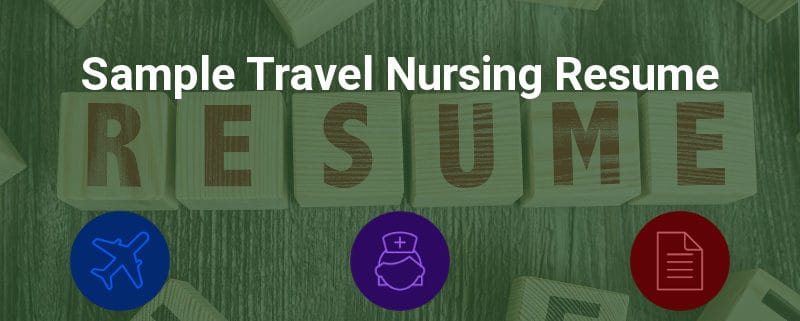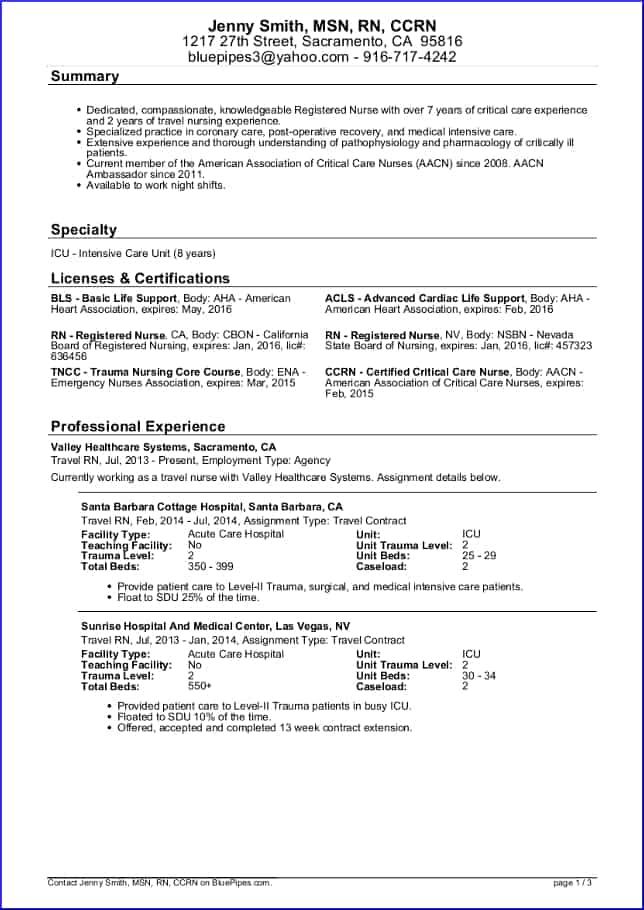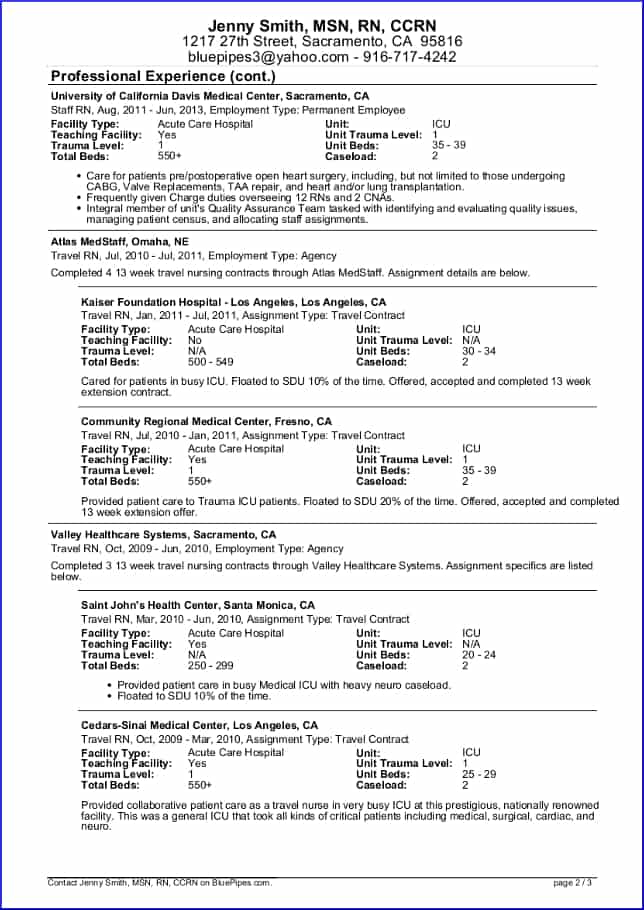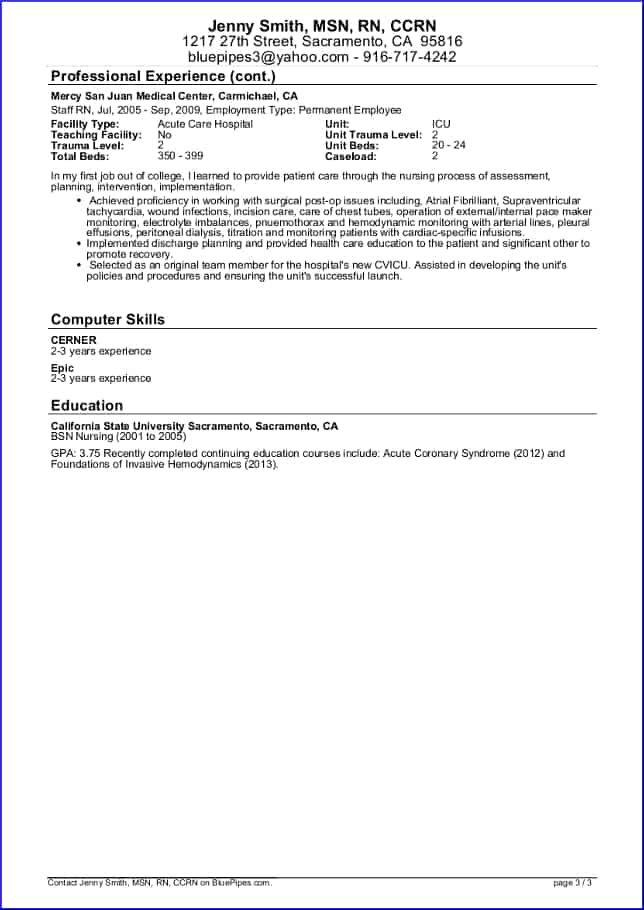Sample Travel Nursing Resume – Free Template and Ultimate Writing Guide
The rules for travel nursing resumes are totally different than resumes for permanent nursing jobs. In this article, we’ll discuss the reasons that travel nursing resumes are different. Next, we’ll provide a sample travel nursing resume that you can build using our free travel nursing resume builder. Finally, we’ll provide you with the ultimate travel nursing resume writing guide should you choose to undertake this painstaking process on your own.
5 Things to Know About Travel Nursing Resumes
It’s important to understand some of the unique aspects of travel nursing resumes before reviewing the sample travel nursing resume below.
How Long Should Your Travel Nursing Resume Be?
First, you should not be concerned at all about the length of your travel nursing resume. The number of pages simply does not matter.
Find your next travel healthcare job on BluePipes!
Instead, it’s most important for you to include all of the details that hiring managers and agencies require. Failure to include these details will result in submission delays at best and profile rejection at worst. Therefore, your travel nursing resume should be as long as it takes to get all the required details on it.
Don’t Be Concerned with Clutter
Second, you should not be concerned with how “busy” your travel nursing resume looks. Hiring managers and agencies require a lot of details about every job you’ve held. There is no way to present all of the information they require without the resume looking “busy”.
In fact, hiring managers and agencies actually expect to see long, busy resumes. They understand they require a lot of details and they are accustomed to busy resumes.
Your Resume Is Often Not Even Seen By Hiring Managers
In fact, the Applicant Tracking Systems used by agencies actually generate long, busy resumes. You see, when you complete an agency’s online application, the Applicant Tracking System uses the information to create a resume. The agency sends that resume to the hiring manager for any job they submit you for.
Why Do Agencies Want A Travel Nursing Resume?
Of course, that begs the question, why do travel nursing agencies even want a resume if they’re not going to send it to hiring managers? Agencies understand that they have extremely long application processes. That lengthy process results in candidates abandoning the process at a fairly high rate.
Therefore, many recruiters will take your resume and enter the information into the applicant tracking system so you don’t have to Moreover, if you have a great travel nursing resume, like the one you can create on BluePipes, then the agency may submit it to the unit manager directly to speed the process up. Also, some agencies use resume parsing software. This software reads your resume and enters it into their applicant tracking system so you don’t have to.
You Do Not Need To Customize Your Travel Nursing Resume
Finally, you do not need to customize your travel nursing resume in any way. Standard resume advice for permanent jobs is to customize your resume to fit the description of the specific job you’re applying for. This is not the case for travel nursing resumes.
Discover the ultimate travel nursing pay calculator.
There is no need to customize your Summary or your job descriptions for specific travel nursing jobs. Leave that to the recruiters you work with. As mentioned above, the recruiters are the ones who will get your profile ready to submit for each job.
Sample Travel Nursing Resume
Below is a sample Travel Nursing Resume you can create on BluePipes.com for free. We actually modelled the BluePipes resume after the resumes that the industry’s most popular Applicant Tracking Systems create. Our goal is to ensure you fill out less paperwork. To that end, your BluePipes profile is designed to help you recognize and record all the details.
And, unlike other resume builders and career related websites, you’ll be pleased to know that BluePipes will never sell your personal contact information to third parties.
Additionally, you can render your BluePipes profile as a Travel Nursing Job Application. BluePipes also has over 100 comprehensive Travel Nursing Skills Checklists that you can complete, save and download. Together, these documents give travel nursing agencies everything they need to initiate the submission process for travel nursing jobs. It’s all free for members and will save you countless hours of paperwork!
The BluePipes Travel Nursing Resume
Please note, if you intend to use this sample BluePipes resume as a guide to creating your own resume, then we highly recommend you read the Ultimate Travel Nursing Resume Writing Guide below. You will find many more items in the guide that the sample resume does not include. This is because BluePipes includes these additional required details in the BluePipes Job Application.
The Ultimate Travel Nursing Resume Writing Guide
As we mentioned above, the top priority for your travel nursing resume is that it includes every last detail that hiring managers commonly require to see in a travel nursing resume. This way, hiring managers will not reject your resume, recruiters will actually be able to use your resume and submit you faster, and you’ll fill out less paperwork.
Here is what to include on your travel nursing resume:
How to List Your Personal Contact Information on Your Travel Nursing Resume
Provide the following personal contact information on your travel nursing resume:
- Full legal name
- Full address (use your tax home address)
- Professional email address
- Cell phone number
Include a Summary on Your Travel Nursing Resume
Include a Summary on your travel nursing resume. Here is a link to an article that discusses how to write an amazing nursing resume Summary.
The original Universal Profile and Credential Management for travelers.
Please do not include an “Objective”. Here is a link to an article that discusses why you should not include an Objective on your travel nursing resume.
How to List Licenses and Certifications on Your Travel Nursing Resume
- List EVERY license and certification you have by both acronym and full name
- Include the license or certification number if applicable
- Provide the licensing or certifying body for EVERY license and certification you have
- Include the expiration date for EVERY license and certification
- If there is no expiration, then provide the date obtained
- If it’s a compact nursing license, then clearly state it
How to List Specialty Information on Your Travel Nursing Resume
- List each of the specialties you have experience with
- Provide the number of years of experience you have with each specialty
- Include the number of years of experience you have at trauma and/or teaching facilities if your experience includes that
How to List Work History on Your Travel Nursing Resume
Include the following information for EVERY facility you’ve worked for:
- Facility’s full official name
- Facility location
- Job Title
- Exact start and end dates (4/4/2019…not 4/2019)
- Facility type: Short term acute care? Long term acute care? Children’s Hospital? Etc.
- If it was a teaching hospital, then state that
- If it was a trauma hospital, then state the trauma level
- Number of beds in the entire facility
- Unit worked (i.e. MedSurg…instead of “4 West”)
- If you floated to other units, then list them and the percentage of time you spent in each unit
- Number of beds on the unit
- If the Unit took trauma patients, then state that
- Caseload or Patient Ratio
- List some of your specific duties (i.e. “Worked with Swan Ganz”…instead of “provided patient care”), patient types (i.e Neuro, Cardiac, Rehab, etc.), and patient age range
- If you took Charge duty, then clearly list it
- List the types of computer and/or charting systems used
- Supervisor name and contact number if the supervisor can be contacted (Remember this is for a travel nursing assignment not a permanent job)
- Reference names, job titles, and contact information
- State whether it was a permanent job, travel assignment, PRN or other
- If it was a travel assignment, then also list the agency’s name and contact information
- If it was PRN or part time, then list the number of hours per week or the number of shifts per month
In case you have trouble finding specific details about the hospital, you can try looking the hospital up on the American Hospital Directory.
How to List Gaps in Employment on Your Travel Nursing Resume
Many hospitals require some explanation about gaps in employment of greater than 4 weeks. Therefore, you should list such gaps in your work history. To do so, display a start date, end date, name and explanation for the gap.
Should You List the Hospital or the Agency on Your Travel Nursing Resume?
One of the most common questions we receive is, “Should I list the hospital or the agency on my travel nursing resume?” You should include both the hospital and the agency on your travel nursing resume. The reason is that many hiring managers, VMSs and MSPs will not accept a profile without the employer of record, which is the agency, and a list of the hospitals complete with all the necessary details including unit worked, number of beds, dates of employment, etc.
Own your own skills checklists on BluePipes.
There are two ways you can do this. First, you can display the agency and your dates of employment with the agency. Then, you can nest each assignment under the agency you worked the assignment with. This is how the BluePipes travel nursing resume builder does it. You can see an example above.
Alternatively, you can list each assignment and include the name of the agency you worked the assignment with for each assignment. The issue with this approach is that you end up repeating the same agencies over and over. However, it is easier to format if you’re creating your own resume from scratch.
In any case, we highly recommend against lumping all your travel nursing work into one entry on your travel nurse resume. This is because it does not meet the requirements of the vast majority of gate keepers in the process.
How to List Your Education on Your Travel Nursing Resume
Include the following information for all education pertaining to healthcare:
- Education institution’s full official name
- Full address
- Telephone number
- Exact dates of attendance
- Name of degree achieved
- List all professional affiliations
- List all professional honors and awards
Computer/Charting Skills
The BluePipes resume builder includes a section for Computer Skills. We do this because, as recruiters, we found that hiring managers were much more likely to find this important piece of information if we highlighted it separately as opposed to putting it within the larger framework of the job description. That said, this section is optional, so you can decide what works best for you.
Languages
You might consider adding a section for Languages if you speak multiple languages fluently. Alternatively, you can include your languages in the Summary section.
Wrapping up
There is no denying that this is a massive list of items for you to include on your travel nursing resume. However, these items are important because hospitals and nursing managers commonly require them in order to consider travelers for open jobs. By including all the items, you ensure that your recruiters have all the information they need to get you submitted quickly and conveniently for any job order that you’re interested in.
This free eBook will help you negotiate travel nursing pay like a pro.
Rather than tracking all this data yourself, you can use BluePipes to create a travel nursing resume that recruiters and agencies will love. Additionally, you can create your own travel nursing job application and skills checklists with BluePipes as well as store copies of your licenses, certifications and clinical records. This way, you can conveniently email all your travel nursing documents to anyone you choose at your convenience.
Here’s what some of our members and clients have been saying:
Transitioning from Travel to Perm Nursing Resume
When you’re interested in transitioning back to a permanent job, we recommend reviewing our article Transitioning from Travel Nurse to Permanent Employee, as well as our Top Ten Details to Include on a Nurse Resume.











Can you actually get a free template to use, or do you have to pay to join Blue Pipes to get the “free” template you advertise?
Hey Lori.
Thanks for the inquiry. Yes, all of our services, including the resume, are free. To create a resume, you join BluePipes, complete your profile and select the Download option on your profile page to download the resume, or you can email a copy to anyone from the File Cabinet. Our profile is designed to help you recognize and record all the vital details hiring managers typically require.
Please let me know if there are any questions or concerns. Thanks again!